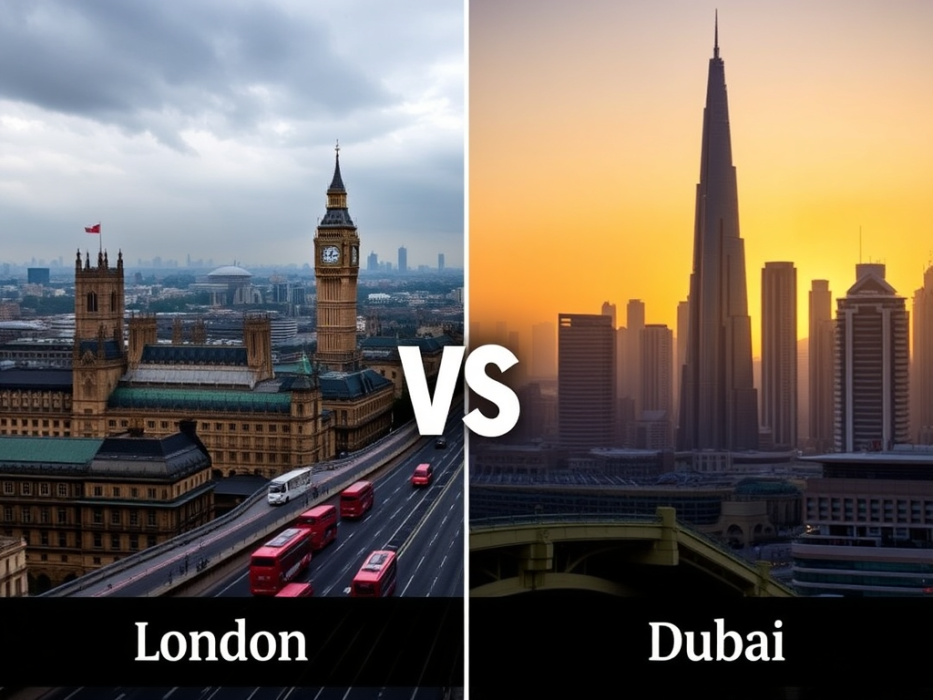For international investors building a diversified property portfolio, both Dubai and London stand out as world-class cities with strong real estate credentials. Each market offers a distinct mix of lifestyle appeal, infrastructure, and long-term investment potential.
However, when it comes to Dubai vs. London property investment, the decision often comes down to return on investment. Dubai has built a reputation for higher rental yields, more accessible entry points, and a tax-free environment. London, by contrast, remains a global safe haven with a stable legal framework and established demand.
This article explores the key differences between the Dubai and UK property markets, with a focus on performance in 2025. We’ll compare ROI potential, taxes, buyer access, and market trends to help you make a confident and informed investment decision.
Overview of Dubai and London as Global Investment Hubs

City Profiles and International Appeal
Both Dubai and London are leading global cities that attract investors from around the world. However, they offer very different environments for property ownership.
- London is a longstanding financial and cultural capital with a mature property market. It has broad international recognition, supported by global institutions, elite universities, and a dense network of high-value real estate.
- Dubai has emerged as a fast-growing global city focused on innovation, infrastructure, and ease of doing business. Its master-planned communities, tax-friendly policies, and investor incentives have made it one of the most dynamic real estate markets in recent years.
Why These Markets Attract Investors
- London appeals to those seeking long-term asset preservation, prestige addresses, and secure legal structures. It has strong demand from both local and international buyers, including students, executives, and families.
- Dubai attracts investors with high rental yields, no property tax, and modern, design-led developments. The city continues to benefit from regional migration, digital nomads, and a young professional population.
Understanding how each city functions as an investment hub sets the stage for a deeper comparison of returns, costs, and legal structures.
ROI Comparison of Which Market Performs Better in 2025?
Rental Yields and Income Potential
When comparing Dubai vs London property investment, rental yield is one of the most significant factors.
- Dubai continues to outperform many global cities in terms of gross rental yield, with averages ranging from 6% to 10%, depending on the area and property type. Communities such as Jumeirah Village Circle, Business Bay, and Mohammed Bin Rashid City consistently attract long-term tenants and offer high occupancy rates.
- London, while stable, typically delivers lower rental yields. Central London zones often see gross yields between 3% and 5%, with prime addresses generating less than newer, outer-zone developments. Rising costs and property taxes can further reduce net income.
Capital Appreciation Trends
- Dubai’s property market has shown strong post-pandemic recovery, especially in emerging zones where off-plan developments are gaining traction. Investor-friendly initiatives such as the Golden Visa and Expo legacy projects continue to support capital growth.
- London’s growth remains steady but restrained by higher entry costs, limited housing supply, and economic headwinds. While some boroughs offer modest appreciation, significant gains are often limited to smaller units in regeneration areas.
For investors seeking higher returns in 2025, Dubai currently offers more attractive income potential and stronger appreciation, particularly in off-plan and design-led developments.
Entry Costs and Affordability
Initial Investment Requirements
One of the key differentiators in the Dubai vs UK property market is the cost of entry.
- Dubai offers comparatively lower purchase prices, especially in emerging areas. Investors can access premium, design-led properties with flexible off-plan payment plans and lower upfront commitments. This accessibility has made Dubai especially attractive to international buyers and first-time investors.
- London, on the other hand, has a much higher barrier to entry. Average property prices in central zones can be significantly higher, with cash buyers often needing upwards of £1 million for mid-range apartments in prime locations. Financing rules are stricter, and large deposits are typically required.
Access for Foreign Buyers
- Dubai provides 100% freehold ownership to non-residents in designated zones, with a transparent purchase process supported by the Dubai Land Department. There are no restrictions on nationality, and transactions are typically faster than in most global cities.
- London is open to foreign investors but involves a more complex legal process. Overseas buyers may face additional scrutiny from lenders, along with stricter Anti-Money Laundering (AML) requirements, and rising concerns around overseas property ownership have led to increasing regulation.
For global investors comparing Dubai vs London property investment, the affordability and accessibility of the Dubai market make it a compelling choice, particularly when seeking to diversify across multiple units or developments.
Tax Environment and Net Returns
Property-Related Taxes
Tax policy plays a central role in determining an investor’s actual return. Here, the contrast between Dubai and the UK is particularly stark.
- Dubai offers a highly favourable tax structure. There is:
- No income tax on rental earnings
- No capital gains tax on resale
- No annual property tax
This environment allows investors to retain more of their rental income and profits, significantly improving net ROI.
- No income tax on rental earnings
- London presents a more complex tax landscape. Investors are subject to:
- Stamp Duty Land Tax (SDLT) – an upfront tax on property purchases, with higher rates for overseas buyers and second properties
- Capital Gains Tax (CGT) – levied on profit from property sales
- Income Tax – applied to rental income, with limited allowances for deductions
- Council Tax – ongoing annual charges based on the property’s location and value
- Stamp Duty Land Tax (SDLT) – an upfront tax on property purchases, with higher rates for overseas buyers and second properties
These taxes can erode overall profitability, particularly for non-resident investors who are also subject to changes in UK property legislation.
Landlord Costs and Ongoing Fees
- In Dubai, annual costs mainly include:
- Service charges, paid to building or community management
- Optional costs for furnishing, maintenance, or property management services
These are typically predictable and relatively low in comparison to European cities.
- Service charges, paid to building or community management
- In London, investors must budget for:
- Council tax and maintenance costs
- Letting agent fees, often 8–15% of annual rent
- Compliance costs, such as safety certifications, energy performance updates, and licensing (in some boroughs)
- Council tax and maintenance costs
For investors prioritising simplicity and strong net returns, Dubai’s tax-free structure provides a major advantage in the Dubai vs London property investment debate.
Legal Framework and Buyer Protection

Regulatory Environment
Both cities operate under transparent legal systems, but their processes and requirements differ significantly in terms of complexity and speed.
- Dubai has streamlined its property transaction system under the Dubai Land Department (DLD) and the Real Estate Regulatory Agency (RERA). For off-plan purchases, buyer funds are held in escrow accounts regulated by the government. Property transfers are typically completed within days and involve clear procedures.
- London operates under UK common law, with solicitors playing a central role in due diligence and transaction handling. While the system is robust and well-established, it can involve lengthy timeframes, often 8 to 12 weeks for completion, and higher legal fees.
Risks and Safeguards
- In Dubai, off-plan properties must be registered and approved before being marketed. Developers are required to meet specific financial and construction milestones before accessing buyer funds. These measures significantly reduce risk and protect investor interests.
- In London, the legal system offers strong protections, particularly for freehold ownership. However, issues such as leasehold terms, cladding concerns, and fluctuating mortgage conditions have added new layers of complexity in recent years.
Overall, Dubai’s modern, centralised system provides clarity and efficiency, particularly appealing to international investors seeking ease of transaction and regulatory oversight.
Lifestyle, Tenant Demand, and Use Potential
Target Tenant Demographics
Understanding who lives in each city helps investors align their property with consistent demand.
- Dubai attracts a growing population of young professionals, entrepreneurs, remote workers, and high-net-worth expatriates. Many are drawn by tax incentives, high-quality infrastructure, and a vibrant lifestyle.
- London has a diverse tenant base that includes students, executives, families, and long-term residents. Its established education sector and financial services industry ensure consistent demand, particularly in Zones 1 to 3.
Property Use Cases
- In Dubai, property investors benefit from flexible use options. A unit can be used as a residence, rented long-term, or listed on the short-term market through holiday home licences. This flexibility increases income potential and usage for part-time residents.
- In London, short-term rentals are heavily regulated, particularly in central areas. Most investors rely on long-term tenancy agreements, which can be subject to caps, deposit limits, and notice requirements.
Liveability Factors
- Dubai offers year-round sunshine, low crime rates, excellent healthcare, international schools, and family-friendly communities. Developments by Ellington prioritise wellness, design, and liveability, contributing to long-term tenant retention.
- London is known for its walkability, public transport, cultural heritage, and green spaces. However, cost of living, weather, and property maintenance requirements can influence tenant decisions, particularly in outer boroughs.
For investors comparing London vs Dubai real estate, Dubai’s broad tenant appeal and multi-use flexibility support stronger performance in both short- and long-term strategies.
Emerging Trends and 2025 Market Outlook
Dubai: Sustained Growth with Market Stabilisation
Dubai’s real estate market has demonstrated remarkable resilience and growth in recent years. According to Deloitte, the city’s population surpassed 3.8 million in 2024, reflecting a 5% year-on-year increase, with overnight tourist arrivals rising by 9% compared to 2023 . These factors have bolstered demand in the property sector.
While property prices experienced a slight dip of 0.57% in January 2025, marking the first decline since mid-2022, this suggests a potential market stabilisation after a period of rapid growth . Despite this, the off-plan segment continues to expand, with 53 project launches from 37 developers introducing 12,400 units.
Knight Frank predicts that residential prices in Dubai will rise by an average of 8% in 2025, moderating from the significant increases seen in previous years . The government’s initiatives, including long-term visas and investor-friendly regulations, continue to attract foreign investment and support the market’s growth trajectory.
London Offers Gradual Recovery Amid Economic Adjustments
London’s property market is poised for a period of gradual recovery in 2025. After several years of subdued price increases, the capital is expected to see a resurgence in demand, driven by a return to office work and the city’s enduring global appeal. Rightmove forecasts a 4% rise in UK house prices in 2025, with London anticipated to exceed this average.
Analysts predict that the UK property market will be favourable for buyers in 2025, offering better negotiating power due to increased housing options and cautious optimism in the market. However, the market faces challenges, including economic uncertainties and potential policy changes.
Working with the Right Developer: Ellington’s Role in Dubai ROI

Why Developer Selection Matters
When comparing Dubai vs UK property market opportunities, the choice of developer is just as important as the location or asset class. Build quality, design standards, delivery timelines, and after-sales support all impact long-term return on investment and tenant retention.
Working with a trusted developer helps:
- Preserve capital through high-quality construction
- Increase rental demand through design-forward, lifestyle-focused residences
- Ensure transparency in the purchase process
- Reduce maintenance and operational issues post-handover
What Sets Ellington Properties Apart
Ellington Properties stands out in Dubai’s competitive real estate market through its unwavering focus on quality, design, and investor value. Every project is crafted to meet the expectations of modern residents and global investors.
- Design-Led Communities: Residences are created with functional layouts, natural light, and refined interiors that elevate everyday living. This thoughtful approach directly supports tenant appeal and resale value.
- High-Performing Locations: Ellington projects are situated in communities with strong rental demand and long-term appreciation potential, including Mohammed Bin Rashid City, Business Bay, and Jumeirah Village Circle.
- Global Investor Support: From virtual tours and clear purchase documentation to multilingual sales teams, Ellington is equipped to support buyers from around the world through a smooth and transparent transaction process.
For investors evaluating London vs Dubai real estate, partnering with a developer like Ellington not only ensures asset quality but also supports better performance through design, planning, and execution.
Dubai or London – Which Market Offers Better ROI in 2025?
Both Dubai and London are globally respected real estate markets, but for international investors focused on return on investment, the differences are significant.
London offers long-term security and a mature legal framework, yet often comes with higher entry costs, lower rental yields, and a complex tax structure. Dubai, by contrast, provides stronger net returns, lower upfront investment, and a more flexible, tax-efficient environment.
In 2025, Dubai stands out for its:
- Higher rental yields
- Accessible off-plan opportunities
- Transparent and investor-friendly regulations
- Strong tenant demand across design-led communities
For investors seeking to optimise returns while aligning with emerging market trends, Dubai currently offers a more compelling investment case. When paired with a reputable developer like Ellington Properties, known for architectural excellence, prime locations, and international buyer support, the potential to maximise ROI becomes even more tangible.
Explore Ellington’s current developments and find the right opportunity to strengthen your global property portfolio.







